|
|
| 'Like' us on Facebook | Follow us: |
Posted on: Jan 22, 2016
Satsang With Techie - Part 06
 |
 |
| Download |
Part 01 || Part 02 || Part 03 || Part 04 || Part 05 || Part 07 || Part 08
Sairam and welcome to the sixth episode of 'Satsang with a Techie'. This satsang started with an accidental meeting in a restaurant in Bengaluru between two childhood friends, Varun, a techie who lives in Bengaluru and Vivek, an alumnus of Sri Sathya Sai Institute of Higher Learning who has settled down in Prasanthi Nilayam to dedicate his life in the service of Baba. Following the chance meeting, Varun becomes somewhat curious about spirituality and agrees to come to Prasanthi for the weekend to continue his education in spirituality. Saturday arrives and Varun is in Prasanthi and has His first darshan (this is set in 2009). After this, Varun and Vivek discuss many things over the next two days. Thrilled with the new paradigms that were now opening up, he comes back the following weekend. In the previous episode we had a glimpse into what they discussed after the morning Darshan. The current episode takes us to the evening session of their discussion. The two friends meet again after Evening darshan. Let us now join them. |
VARUN: Sai Ram Vivek, I am simply dying to continue our conversation from where we left off this morning. If I recall, you were saying something about the different voices with which the Mind and the Heart speak. Can you go over that in greater detail so that it all becomes clearer to me?
VIVEK: Sure. You see Varun, when we ask ourselves a question there are basically two voices that speak from within.
VARUN: Two voices? I always thought there was only one. How come there are two voices, and what exactly are they?
VIVEK: Ah, that is an important question, and that precisely is where the issue of Identity Crisis I spoke of earlier comes into the picture.
VARUN: I am afraid that right now, all that you are saying sounds quite mysterious.
VIVEK: Don’t worry; I shall explain it all, step by step. To start with, I do hope you remember my mentioning earlier that a human being is really a mixture of three distinct entities, namely, the gross body, the subtle Mind and the Atma, which, I remind you, is the source of everything in the Universe.
VARUN: Let me restate it this way; you are effectively saying that every human being is a MBA, that is, a composite of the Body, the Mind, and the Atma.
VIVEK: Hey, that is a cute way of putting it! By the way, that’s how Swami Himself used to describe the composition of a human being to His students.
VARUN: Thanks for the compliment; would you now please take the point further?
VIVEK: Sure will. You see Vivek, the body exists in the world and is naturally highly tuned to the surroundings and what happens there; it is all a part of the evolution process of course.
VARUN: Anything wrong with that?
VIVEK: I am not suggesting that anything is wrong. All I am pointing out is that by the very nature of the evolutionary process, it is natural for the body to be focussed on the world.
VARUN: OK, what about the Mind? Where is its focus?
VIVEK: That Varun, is the key question.
VARUN: In what way?
VIVEK: Well, there is an aspect of our Mind that is totally focussed on the external world, and rightly so.
VARUN: How come?
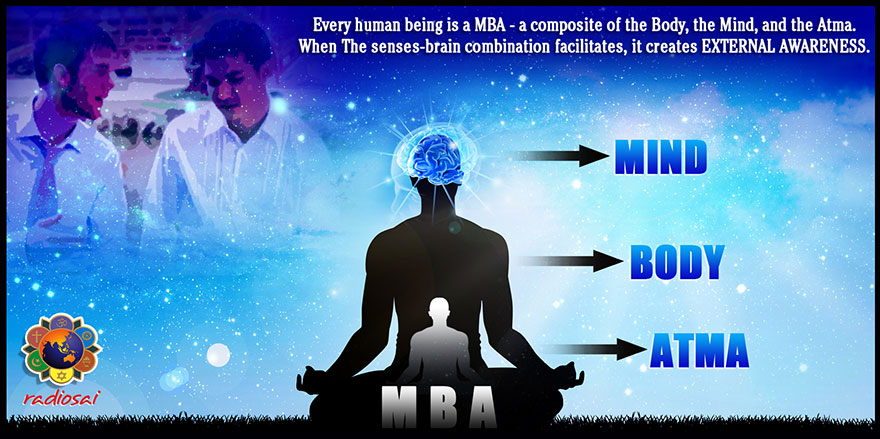 |
VIVEK: This again is the result of evolution. As you know, even lower living species have some kind of a rudimentary brain; it is the brain, with help from the various senses of course, that keeps track of what happens around.
VARUN: OK, there is a brain-senses combination that keeps us aware of the external world. But what has that got to do with the Mind?
VIVEK: Good question and a key one too; I am coming to that. Meanwhile, let us note that the combination made up of the senses and the brain serves an important purpose, namely, it aids survival.
VARUN: You mean like a deer in the forest picking up warning signals that perhaps there is a tiger in the neighbourhood and, using that information, tries to quietly sneak away, far away from the tiger?
VIVEK:That’s exactly right. The senses-brain combination facilitates what I might call EXTERNAL AWARENESS.
VARUN: You mean, being conscious of the world around us?
VIVEK: Correct. Thanks to the brain working in active conjunction with the senses, we are able to be aware or CONSCIOUS of the external world.
VARUN: You used two interesting words, awareness and consciousness; any differences between the two?
VIVEK: In my view, there certainly is. I would say that being aware implies mere recognition of the existence of something in the world around us; being conscious means understanding the implications of what exists – at least that is the way I see it.
VARUN: You appear to be making a difference between awareness and consciousness; if true, any reason why you are doing so?
VIVEK: Sure I am trying to make a difference.
Take the Himalayas. Even when one is miles away, one can see the ice and snow on the mountains. A tiger prowling in the foothills can see the snow on the mountains, just as a forest ranger living in the forest there also can. To the tiger, the snow exists but does not mean anything in particular. The forest ranger knows, however, that during summer, there is water in the stream near his lookout cabin because of melting snow.
There is in this case, a higher-level of awareness that enables the ranger to connect the snow in the mountain far away with water in the stream near his house, especially in summer. He is not merely aware of the existence of snow but is conscious of the role that the snow plays, at least to a certain extent.
VARUN: That sure is an interesting point.
VIVEK: And an important one too.
VARUN: In a vague way, I understand that; but I presume the difference is important from a Spiritual point of view. Isn’t that the point you are trying to make?
VIVEK: That is exactly correct. You see Varun like all beings, humans too have a brain, senses and awareness.
VARUN: Except that in humans the brain is extra-ordinarily developed.
VIVEK: Considering the utterly stupid manner in which humans sometimes behave, I wonder! But I shall not get into that argument right now. What I would like to state at this point of time is that in humans, consciousness about the external world is very highly developed.
VARUN: I notice you are cautiously using the phrase “external world”, implying there is a lot more.
VIVEK: Indeed there is, and I am glad you have spotted the point even before I have mentioned it.
You see Varun, our capacity for being aware and conscious is not due entirely to the combination of the senses and the brain, referred to by scientists as the meat-machine. There is a superior agency called the Mind, that is not made up of atoms and molecules. It is a subtle entity, and it is this Mind that endows humans with so much capability and power.
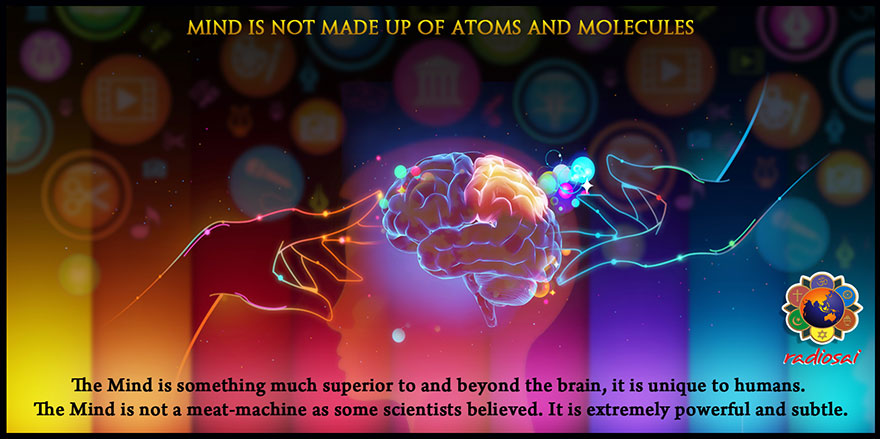 |
VARUN: This is getting to be interesting. As I see it, you are making a distinction between the brain and the Mind, right?
VIVEK: That is correct.
VARUN: Is there universal acceptance of this view?
VIVEK: No, there is not; there is quite a split where opinions on this matter are concerned, and we can discuss that later maybe. Right now, whatever I am saying is based entirely on Vedantic principles, particularly as expounded by Lord Krishna a long time ago, and elaborated in great detail in recent times by our beloved Swami.
VARUN: OK, if I am to put what I have gathered so far in simple terms, they are the following:
1) The Mind is something much superior to and beyond the brain,
2) the Mind is unique to humans,
3) the Mind is subtle, and not a meat-machine as some scientists would have us believe, and finally,
4) the Mind is extremely powerful.
VIVEK: You have beautifully summarised all that I wanted to say, and very crisply too. There is one more thing I should add.
VARUN: Which is?
VIVEK: The Mind helps us to ask deep questions and look beyond the external world.
VARUN: That I am unable to understand, although something in me tells me that you are making an important point.
VIVEK: [smiles] That is a most encouraging comment. Now before we proceed further, let us remind ourselves once more of the crucial fact that every single human being is really a composite of three distinct entities.
VARUN: You mean the gross body, the Subtle Mind and the Causal Atma?
VIVEK: Yes of course, and I am so glad you recall them correctly, especially at this juncture.
You see Varun, our personality, our emotions, our character, the way we react to people and events are all critically dependent on how this mix is.
VARUN: That, I do not quite follow.
VIVEK: Let me put it this way.
Consider a person who is not educated and besides being illiterate, is crude, vulgar, a prey to all vices, gets angry in a flash, rather selfish and greedy, becomes jealous easily, is prone to violence, etc. You would agree that there are people like that in this world.
VARUN: Oh sure, in plenty too, some of them even supposedly educated.
VIVEK: OK, we agree there. Let us now go to the underlying question: Why are these people like that? What makes them behave the way they do?
VARUN: That is a bit of a complicated question. I mean a person who has lived almost all alone deep in the forest, a kind of a tribal, would behave like you said when he comes into contact with you and me. Perhaps he would feel insecure in the company of people of a very different mould and that insecurity would make him behave worse than he really is.
VIVEK: I must compliment you Varun, for giving a thoughtful and objective reply. Indeed, there is much truth in what you say, and your remarks help me in crisply discussing the factors that shape our personality, and how they manage to do it.
VARUN: That is something I am very keen to know about.
VIVEK: Well, here it is. Varun, no doubt it all started with the Atma, not merely our own particular lives but indeed the whole of Creation. As Krishna emphatically declares in the Gita, everything in the Universe has come from Him; that is to say, He is the Primordial Seed from which everything has sprung.
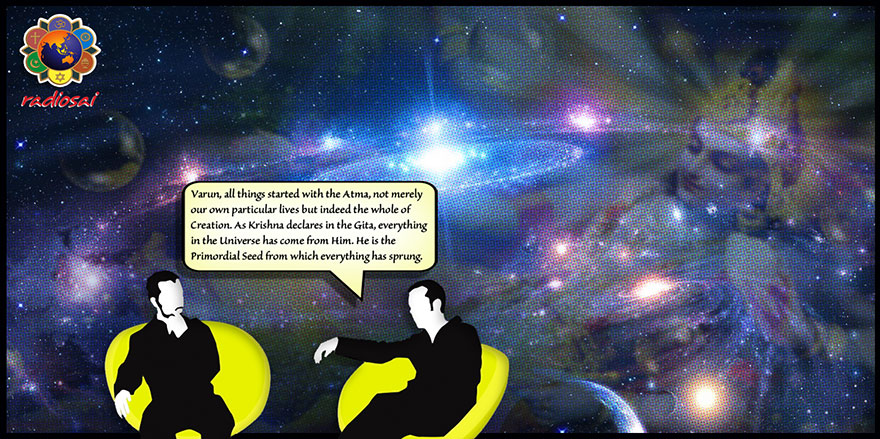 |
VARUN: So, when you say there is Atma within us, it is a reference to the Divine Genes within us?
VIVEK: You know Varun, that is a cute phrase you have just used. In a manner of speaking, each of us has really three genes that shape us, each in their own particular way.
VARUN: Three genes?
VIVEK: Biologically speaking there is only one type, the one that leads to our physical body, determining in the process, the colour of our skin, our eyes, our hair, and so on. But then, as you yourself just now pointed out, we also have the Divine Genes.
VARUN: The Divine Gene stuff was something I just made up.
VIVEK: Maybe, but the fact of the matter is that this Divine Gene as you call it is indeed a component of our personality. Thus, while our body can be traced back to the biological gene, our Atmic nature can be traced to the Divine Gene as you have so beautifully described it.
VARUN: Vivek, earlier you said that we are made up of the body, the Mind and the Atma. We have assigned a gene to two of the three entities; what about the third entity?
VIVEK: You mean the Mind?
VARUN: That’s right; can one associate any kind of gene with the Mind?
VIVEK: Indeed we can.
VARUN: Any name for the gene that might be associated with the Mind?
VIVEK: Sure there is; it is called the Vasanas.
VARUN: I see; can you say something more? I mean if the bio-genes came from parents and ancestors, while the Divine Gene came from God Himself, where did these Vasanas come from?
VIVEK: Very good question.
VARUN: And the answer is?
VIVEK: It comes from us! We alone are responsible for the Vasanas!
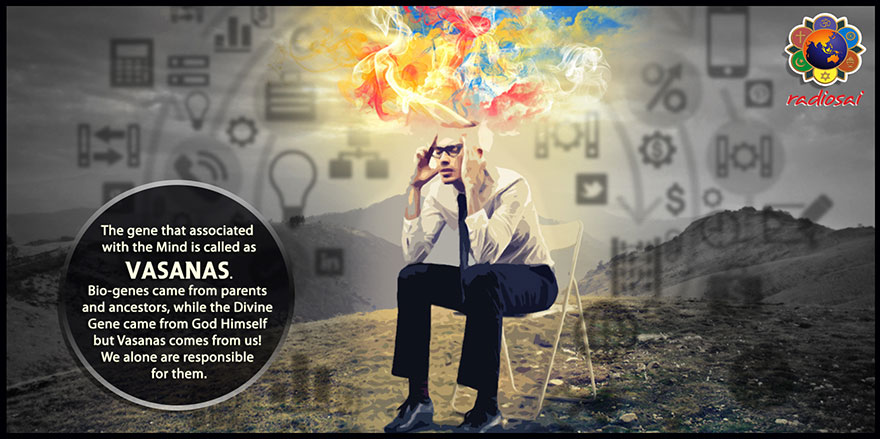 |
VARUN: Come on Vivek, you must be kidding! I have never heard any such thing before.
VIVEK: Sure, you would not have read it in any modern science book, but it is all there is Vedanta; and Krishna explains in detail how the Vasanas play a critical role in shaping our personality.
VARUN: All this is so new to me that you had better explain it slowly and in such a manner that a Spiritually ignorant techie like me can understand!
VIVEK: No problem!
You see Varun, when modern day scientists consider evolution they focus on only two aspects of it. On the one hand there are the astronomers, the astro-physicists, the elementary particle physicists and of course the cosmologists, for whom evolution means the full story of the Creation and the development of the Physical Universe, from the Big Bang, right up to what the Universe is today.
VARUN: And I suppose these folks are interested only in inert matter.
VIVEK: That is exactly right. They would talk about everything from how the Baby Universe was when it was just 10-35 seconds old, all the way to birth and death of stars, formation of planets, quasars, supernova explosions, dark matter, dark energy – you name it. But it is always about inert matter.
VARUN: When you say inert matter, you of course mean matter that has no life in it.
VIVEK: Correct. But we know that the story of the Universe cannot told entirely in terms of the evolution of inert matter alone. There is life, at least here on earth, and we have to explain that also.
VARUN: I believe many biologists have grappled with that problem.
VIVEK: Indeed, and it all goes back in a sense to Charles Darwin, who was the first one to speculate seriously how living species evolved.
VARUN: And if I understand correctly, since then there have been many lines of attack on this question of the origin and the evolution of living species.
VIVEK: Yes indeed. There are some who spend all their time figuring out how it was that life first appeared on our earth, roughly 3.5 to 4 billion years ago. I believe, our earth itself came into existence when a new solar system with our Sun as the parent star came into existence about 5 billion years ago.
VARUN: And just to put it all in perspective, the age of the Universe is….?
VIVEK: The best estimate obtained recently from some beautiful and accurate satellite experiments is that our Universe is about 13.8 billion years old, give or take a few hundred million years.
VARUN: So, if I get you correctly, there has been much discussion amongst scientists on two strands of evolution, the evolution of inert matter all the way from the Big Bang, and the evolution of life, at least on earth, all the way from the appearance of the first living molecule so-called about 3.5 billion or so years ago.
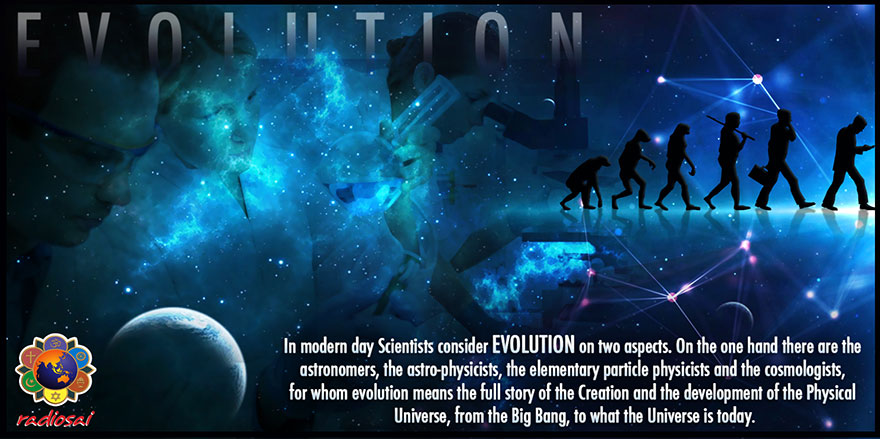 |
VIVEK: That is a nice summary of what we have been discussing thus far.
VARUN: OK, but where does the Mind fit into all this?
VIVEK: Ah, that is the question we are coming to, and it is quite a fascinating story. You may say that this story adds a third strand to the history of evolution.
VARUN: So the evolution story has really three strands and not just two – is that what you are saying?
VIVEK: Yes and this third strand is connected with the all-important issue of Consciousness.
VARUN: And scientists do not talk about this third strand?
VIVEK: Not at the professional level; however, at the private level, many eminent scientists are breaking out to express views that are very different from the orthodox clan, if I might say so.
VARUN: Sounds absolutely fascinating.
VIVEK: Indeed it is, but if you have seen your watch, you would realise that we must postpone that discussion to our next session!
VARUN: Yuk, why is it that we must always take a break when things get real interesting?
VIVEK: That my dear friend is how the Media converts a simple story into a serial! More seriously, that part of our discussion would require a lot of time, and so it is really wise to take that up in a new session.
VARUN: Which means we break for now, and resume as usual during our night walk, is that it?
VIVEK: Correct! Come on, let’s go.
Graphics by: Sai Kaustuv Dasgupta
- Radio Sai Team
What do you think about this article? Please let us know by writing in to h2h@radiosai.org or you may leave your thoughts in the comments section. Do not forget to mention your name and country.
| comments powered by Disqus |






